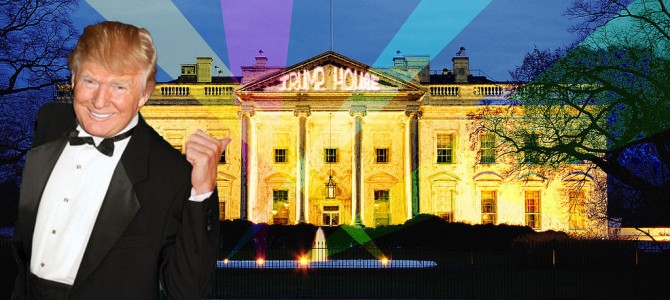
Has there ever been a cult of personality built around a personality so unpleasant?
The answer, by the way, is “yes,” but more about that in a moment.
After Donald Trump’s bombastic performance in last week’s debate, it’s clear that the key to his appeal is not his policy positions, which are all over the map. No, it’s all about his personality, and the paradox is that the more unpleasant his personality is revealed to be, the greater his appeal to his core group of supporters.
For example, one of my readers responded to my article criticizing the new EPA rules on power plants by touting Trump as the only candidate with “the balls” to dismantle the EPA. In reality, there is no basis in Trump’s background, his ideology (if he had one), or his public statements to think he would do anything in particular with the EPA. But that’s how Trump is regarded: as a cure for what ails you, as an all-purpose tonic for whatever somebody thinks is wrong with our current system.
People are projecting onto Trump what they want to see. They are pouring into him their fantasies about what could be accomplished by a strong leader who doesn’t care about making people angry. But that’s a dangerous fantasy to indulge.
To be sure, every presidential election is about personality. We are electing a leader who is going to make important decisions and will have to stick to them in the face of opposition. So when we look at a candidate, we’re not just looking at the values he endorses, the ideas he claims to believe, or the specific platform he has announced. We’re also asking whether he’s the sort of person who really means what he says, whether he has the guts to stand up to opposition, whether he has the charisma to rally other people to his cause, and whether he has the negotiating skills to broker deals without getting taken for a ride.
But there’s a difference between this kind of judgment about character and a cult of personality. The cult of personality is a general faith in the leader—whereas a considered judgment about a candidate is based on specific facts about the candidate’s record and past performance. So we might look to a candidate’s record in the Senate. Did he stand up against legislative cave-ins? Has he shown a willingness to buck the establishment? Or we might look to his term as governor. Did he accomplish something important? Has he faced down opposition without folding?
The GOP has plenty of people with pretty good records on this. Ted Cruz and Rand Paul have shown they’re not afraid to lock horns with the GOP establishment. Scott Walker and Chris Christie have pushed through state-level reforms against vicious opposition. You may not like the specific positions of some of these candidates—the overlaps between Chris Christie supporters and Rand Paul sympathizers has got to be pretty much nil. But there’s almost certainly someone other than Trump in this race who has a longer, more consistent track record for promoting any particular policy preferences.
That’s not what support for Trump is about. Support for Trump is not about what a candidate has actually done. It’s about how loudly and recklessly he’s willing to break things. Support for Trump is a protest vote, but not a rationally considered protest vote in favor of a specific cause. It’s an expression of general, unfocused rage. Trump supporters just want someone who’s willing to turn over the tables and call people names and burn the place down. And that’s why the more unpleasant Trump is—the more he insults lady reporters and boasts about how rich he is, the more he thumps his chest about how sexy he is and calls everybody else a loser—the more they love him.
The result is a disturbing kind of cult of personality. I asked earlier about precedents for unpleasant personalities as the basis of a cult. Well, consider the original editions of the “cult of personality,” the ones built up around Stalin and Mao. Or more recently, the one built around Venezuela’s Hugo Chavez. All of these men had a certain blustering charisma, much like The Donald, but they could be even more abrasive, boastful, thoughtless, insulting, and crude. And each benefited from the same paradox: the less he adhered to any standards of responsible behavior the more he thrilled his true believers with what a tough guy he was, with how much he was supposedly a strong leader who would face down the capitalist running dog imperialist fascists and deliver for “the people.”
It seems strange that this kind of banana republic cult of personality would find purchase in a republican system (republican with either a small “r” or a big one), but maybe that’s not such an impenetrable paradox. Stable systems of representative government are notoriously slow and resistant to radical change. You can elect a lot of new people to Congress, as insurgents on the right have done in recent years, but the old party leadership stubbornly clings to their positions, and if the last winner of a presidential election is opposed to your agenda, then congressional leaders can’t get much done even if they try. Changing the political system is patient work that takes decades, and most of it is done, not by electing the “right guy” in a single election, but by promoting the right ideas to your fellow citizens and actually convincing people, which is really annoying work.
What doesn’t get the job done is, from my experience, the favorite activity of Donald Trump’s supporters: insulting people on the Internet. So no wonder they want to short-circuit the system and indulge the fantasy that they can push through their agenda, whatever it is, just by electing a guy who will insult people on a bigger scale.
There will always be those who lose patience and long for someone to sweep in and knock everything over and be strong enough to bring everyone to heel. That’s a dangerous illusion, though there are some people who want it enough not to care what their strong man really stands for. But I suspect it’s much smaller number than some of the inflated early poll numbers for Trump would imply.
Follow Robert on Twitter.









